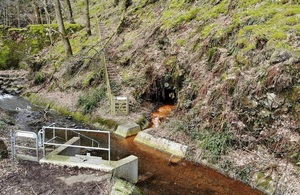Residents to hear Cumbrian plans to clean up metal pollution
A community event will take place next week to explain proposals for a mine water treatment scheme at Threlkeld, near Keswick.

Contaminated water enters the Beck from the adit
Residents are invited to a public event to find out more about work to clean up rivers polluted by the abandoned Threlkeld lead mines.
The Coal Authority and Environment Agency will share the latest updates with the community about a proposed mine water treatment scheme to capture the metals coming out of the abandoned mines before they are released into Gategill Beck.
The public event will take place at Threlkeld Village Hall on Tuesday 14 May. There will be two sessions:
- 2.30-4pm: Drop-in session for community members to speak with staff from the project team, who will be available to answer questions and address concerns.
- 7-8pm: Formal presentation followed by a Q&A session.
Monitoring by the Environment Agency has revealed that elevated concentrations of metals including cadmium, zinc and iron are flowing out of Woodend Low Level Adit, an old tunnel dug by the miners to drain water from the mine.
This mine water pollutes 25km of watercourse from Gategill Beck to Bassenthwaite Lake, which, along with the River Derwent and its tributaries, are designated Sites of Special Scientific Interest (SSSI). This negatively impacts on fish and other aquatic life. Just downstream of the mine, levels of zinc in Gategill Beck can exceed the safe limits for river wildlife by up to 2,500 times.
The proposed mine water treatment scheme will capture the metals before they enter the Beck and then put the treated water back into the watercourse, improving water quality.
The work is part of the Water and Abandoned Metal Mines (WAMM) programme, a partnership between the Environment Agency, the Coal Authority and the Department for Environment, Food and Rural Affairs (Defra), to tackle water pollution caused by historical metal mining across England.
25km of watercourse polluted by contaminated groundwater
Hugh Potter, WAMM lead for the Environment Agency, said:
Our monitoring has shown that 25km of watercourse is polluted by the contaminated groundwater coming from the abandoned Threlkeld mines. This is having an adverse impact on water quality and river wildlife.
The proposed treatment scheme will significantly decrease current levels of pollution, boosting wildlife and improving these local rivers for future generations. The views of residents are important as we develop these plans and I’d encourage people to come along and find out more.
Pledges to reduce river pollution from abandoned metal mines are a key part of the government’s Environmental Improvement Plan (EIP) – in January 2023, it approved a target to halve the length of rivers polluted by harmful metals from abandoned mines by 2038.
The metals from the abandoned Threlkeld lead mines pollute 25 km from Gategill Beck along the Rivers Glenderamackin, Greta, and Derwent, ultimately affecting Bassenthwaite Lake.
Unless addressed, Gategill Beck will continue to be discoloured and the metal pollution adversely impact fish and aquatic wildlife into future generations.
Project is the ‘next stage in the life of the mine’
Mark Stacey, Project Manager at the Coal Authority said:
Threlkeld has a great legacy of mining, surrounded by the beauty of the wild high fells. Our upcoming event aims to encourage the local community to share their thoughts and ask questions about our proposed treatment scheme.
This project is the next stage in the life of the mine and would enable the Lake District to set an example to communities worldwide about cleaning up the widespread problem of pollution by abandoned metal mines.
This is fantastic opportunity for us to proudly resolve the impacts of historical metal mining in the Northern Lake District with clear benefits for future generations.
The proposed mine water scheme has been developed using the best available technology from international mine water experts. The project team is currently gathering feedback on the proposals. Planning permission from the Lake District National Park Authority is required before any scheme can progress. The community will be regularly updated on the project’s progress.
Important note:
Children and young people under the age of 18 must be accompanied by an adult to the drop-in sessions and formal event.